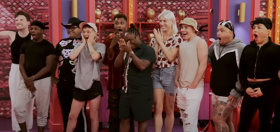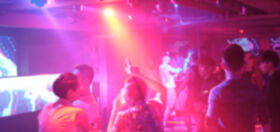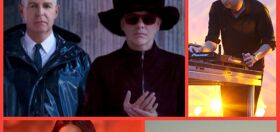
Most of us know what “Stonewall” was. But how many know all the events that led up to that West Village confrontation? Much frustration I hear coming from an older generation of gay men and women (many of who lived through Stonewall) is that younger gays have no connection with the community’s history, little knowledge of our civil rights struggle, and even less desire to learn. That’s where the Queer History Project comes in.
Targeted to Vancouver, Canada (but hopefully planning to grow beyond that border), QHP hopes to record the lives that came before ours — to record the names of history’s heroes and everyday gays. (We particularly like this piece.) Born out of the non-profit Out On Screen (which produces the Vancouver Queer Film Festival), QHP marries the web’s democratization of information with our endless appetite to learn. [Queer History Project]



















Ed
Back when I was a younger gay, I had an older gay friend (who, I suppose, was about the age I am now), tell me the history of a minority community is traditionally passed down verbally, from one generation to another. And he also said that the tradition was broken in the gay community because an entire generation of gay men was dead from AIDS and so the younger generation had no one to teach them. He felt it was the single deadliest blow our community had taken, not only for survival, but equality and unity. Not the Big Death, but the fact that the Big Death had shattered the continuity of our community, its history, and its ability to train new leaders.
Maybe now the web, and projects like this, can capture the history, but it still takes one generation to the next to explain to the young ones why they the history matters. Few young people read history for fun.
Chitown Kev
I think this is a fantastic project.
And you are right Ed about AIDS. The Big Death also shattered some of the continuity between our people and other minority communities as well.
One suggestion. I know in Chicago there is a writer in one of the gay rags, Suzie de la Croix, who does a column on gay history, much of it based on his own memories and interviews (oral history). You may want to contact him and other columnists around the country who do similar type of work. I have noticed there are vast regional differnces when it comes to what could be called “the gay experience.”
Qjersey
lets play “Weakest Twink”?
should be a game show in a bar/lounge
Darrell6tt
There is a great group keeping the history of gay life in Washington, DC alive. Lots of material on their web site: http://www.rainbowhistory.org/
Chitown Kev
Thanks, I didn’t have time to look earlier. Here is a page (with archives) for Chicago.
http://www.windycitymediagroup.com/gay/lesbian/news/ARTICLE.php?AID=2542
Brianna
@Ed:
“because an entire generation of gay men was dead from AIDS and so the younger generation had no one to teach them.”
Umm…lesbians?
Ed
@Brianna: He actually mentioned that in the conversation, that without the lesbians gay culture would not exist – without lesbians picking up the fight for AIDS research, civil rights, and just plain taking care of us while we died, gay male culture would have been extinct. And I agree that we owe our sisters a debt we can never repay.
But if you want to talk culture, we’ve always been different, and there’s something lost in the telling of history from a quasi-outsider. Sure, Jane Goodall lived with the apes, and she groomed them or whatever, but she didn’t relate well enough to the young ones to teach them their culture, the older apes did that. Wow – that was a tortured metaphor.
We share the same struggles for acceptance and rights with our lesbian sisters, but the cultural history is different, and how we relate to each other is different. My conversations with other gay men carry a a familiarity I’ve never achieved with my lesbian friends. I’ve valued those lesbian friends, I owe some of them a debt I can never repay (thanks, Sandy), but the way of relating, and teaching lessons if profoundly different. It’s more academic than personal, at least to me.